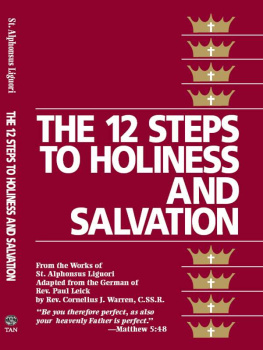St. Alphonsus Liguori - Attaining Salvation (with Supplemental Reading: Catholic Prayers) [Illustrated]
Here you can read online St. Alphonsus Liguori - Attaining Salvation (with Supplemental Reading: Catholic Prayers) [Illustrated] full text of the book (entire story) in english for free. Download pdf and epub, get meaning, cover and reviews about this ebook. year: 2008, publisher: TAN Books, genre: Science. Description of the work, (preface) as well as reviews are available. Best literature library LitArk.com created for fans of good reading and offers a wide selection of genres:
Romance novel
Science fiction
Adventure
Detective
Science
History
Home and family
Prose
Art
Politics
Computer
Non-fiction
Religion
Business
Children
Humor
Choose a favorite category and find really read worthwhile books. Enjoy immersion in the world of imagination, feel the emotions of the characters or learn something new for yourself, make an fascinating discovery.

- Book:Attaining Salvation (with Supplemental Reading: Catholic Prayers) [Illustrated]
- Author:
- Publisher:TAN Books
- Genre:
- Year:2008
- Rating:5 / 5
- Favourites:Add to favourites
- Your mark:
- 100
- 1
- 2
- 3
- 4
- 5
Attaining Salvation (with Supplemental Reading: Catholic Prayers) [Illustrated]: summary, description and annotation
We offer to read an annotation, description, summary or preface (depends on what the author of the book "Attaining Salvation (with Supplemental Reading: Catholic Prayers) [Illustrated]" wrote himself). If you haven't found the necessary information about the book — write in the comments, we will try to find it.
St. Alphonsus Liguori: author's other books
Who wrote Attaining Salvation (with Supplemental Reading: Catholic Prayers) [Illustrated]? Find out the surname, the name of the author of the book and a list of all author's works by series.
Attaining Salvation (with Supplemental Reading: Catholic Prayers) [Illustrated] — read online for free the complete book (whole text) full work
Below is the text of the book, divided by pages. System saving the place of the last page read, allows you to conveniently read the book "Attaining Salvation (with Supplemental Reading: Catholic Prayers) [Illustrated]" online for free, without having to search again every time where you left off. Put a bookmark, and you can go to the page where you finished reading at any time.
Font size:
Interval:
Bookmark:


St. Alphonsus Liguori
1696-1787
Bishop and Doctor of the Church

Permissu Superiorum.
| Imprimatur |  Herbert Cardinal Vaughan Herbert Cardinal Vaughan |
| Archbishop of Westminster | |
| March 28, 1901 |
Originally published by Burns & Oates, Limited, London, in 1901, as Devout Reflections on Various Spiritual Subjects for the Profit of Souls Who Desire to Advance in Divine Love, by St. Alphonsus deLiguori. Retypeset with minor updating (primarily of punctuation) and published in 2008 by TAN Books, an Imprint of Saint Benedict Press, LLC, as Attaining Salvation: Devout Reflections and Meditations.
ISBN 978-0-89555-883-1
Cover Design: Milo Persic
Cover photo: Kreicher/iStockphoto.com
Printed and bound in the United States of America.
TAN Books
An Imprint of Saint Benedict Press, LLC
Charlotte, North Carolina
2012
One soul, one eternity!
St. Teresa of Avila
Do not be astonished at the difficulties one meets in the way of mental prayer, and the many things to be considered in undertaking this heavenly journey. The road upon which we enter is a royal highway which leads to heaven. Is it strange that the attainment of such a treasure should cost us something? The time will come when we shall realize that the whole world could not purchase it.
St. Teresa of Avila
Contents
Preface
T HIS little work of St. Alphonsus was translated and published, together with a series entitled Reflections on the Passion of our Lord, in 1849. The edition is now exhausted, and the work out of print. The Devout Reflections on Spiritual Subjects have been re-translated and are here published separately in a convenient form. The Reflections on the Passion will also be brought out in the same style.
Both works both composed and published together by the Saint when he was in the seventy-eighth year of his age. He was still governing the Episcopal See of St. Agatha, in the Kingdom of Naples, but he was so broken down in health and so crippled by most painful infirmities that it seemed a miracle that he should still be able not only to watch over the affairs of his diocese but even to apply himself to the composition of several important and learned works.
Referring to these labors, the Saints learned and pious biographer, Cardinal Villecourt, remarks: In the midst of all his sufferings of body and mind, St. Alphonsus profited by every moment of leisure to contribute by his writings to the glory of God. Thus in 1773 he published Reflections on the Passion of Jesus Christ, and in the same volume a number of Devout Reflections on Spiritual Subjects. Everyone saw in this little work a loadstone, as it were, to attract the hearts of men and unite them to that of Jesus Christ.
On the occasion of its first publication in Naples, Canon Simioli was charged by Cardinal Sersale, the Archbishop, with the examination of the work. He gave his opinion of it in these terms: I cannot express how great is my esteem for this little book, which is so well calculated to stir up piety and banish tepidity and negligence, especially in these unhappy times, in which charity has grown cold and scandals are multiplied. It is to this pious author that we shall owe the consolation of seeing the fire of divine love enkindled in hearts that are cold, and burning with greater ardor in souls that are fervent. St. Alphonsus himself, in a letter written in the same year, 1773, to one of his penitents, says: I send you two little works, the first of which may assist you in meditating on the Passion of Jesus Christ; I myself make use of it every day. I read likewise, every day, something from the second book, entitled Devout Reflections. I should wish you to do the same, for I have composed it especially for those who desire to give themselves entirely to God.
To such recommendations nothing could be added. And we can only hope and pray that this little work, one of the last written by St. Alphonsus, may be as fruitful of grace now, and in this our country, as it was in his native land, when first it came forth from the pen of the holy Doctor.
E. V.
St. Marys, Clapham
Palm Sunday, 1901
ATTAINING
SALVATION
DEVOUT REFLECTIONS
AND MEDITATIONS
For what doth it profit a man, if he gain the whole world, and suffer the loss of his own soul? Or what exchange shall a man give for his soul? Matthew 16:26
Reflection 1
On the Thought of Eternity
S AINT AUGUSTINE used to call the thought of eternity The Great Thought. This thought made the Saints count all the treasures and grandeurs of this life as nothing more than straw, mire, smoke and dung. This thought has driven so many anchorites [hermits] to hide themselves in deserts and caves, and so many noble youths, and even kings and emperors, to shut themselves up in cloisters. This thought has given courage to so many martyrs to endure racks and iron nails and red-hot gridirons and even being burned alive.
No, we are not created for this earth. The end for which God has placed us in the world is this, that by our good works we may merit eternal life. The end [is] life everlasting. ( Romans 6:22). And therefore St. Eucherius used to say that the only affair that we should attend to in this life is eternity, that is, to gain for ourselves a happy eternity and escape a miserable one. The business for which we work is eternity. If we make sure of success in this business, we shall be happy forever; if we fail in it, we shall be forever miserable.
Happy is he who lives with eternity always in view, with a lively faith that he must shortly die and enter into eternity. The just man liveth by faith, says the Apostle. ( Galatians 3:11). It is faith that makes the just live in the grace of God and that gives life to their souls by detaching them from earthly affections and reminding them of the eternal goods which God holds out to those who love Him.
St. Teresa used to say that all sins had their origin in an absence of faith. Therefore, in order to overcome our passions and temptations, we must frequently revive our faith by saying: I believe in the life everlasting. I believe that after this life, which for me will quickly finish, there is an eternal life, either full of delights or full of torments, which will be my lot according to my merits or demerits.
St. Augustine also was accustomed to say that a man who believes in eternity and yet is not converted to God has lost either his reason or his faith. O eternity! these are his words, he that meditates upon thee and repents not, either has no faith, or if he has faith, he has no heart. In reference to this, St. John Chrysostom relates that the Gentiles, when they saw Christians committing sin, called them either liars or fools. If you believe not (they said) what you say you believe, you are liars; if you believe in eternity and sin, you are fools. Woe to sinners who enter into an eternity which is to them unknown because they would not reflect upon it, exclaims St. Csarius; and then he adds: But alas, O double woe, they enter it and they never come forth! Wretched beings! For them the gates of Hell open only to admit them, not to release them.
St. Teresa used to repeat to her spiritual daughters: My children, one soul, one eternity! She meant to say: My children, we have but one soul, and if that is lost, all is lost; and once lost, it is lost forever. In a word, upon that last breath which we draw in dying depends our being either happy forever, or forever in despair. If the eternity of the next lifeif Paradise, if Hellwere mere opinions of literary men and things of doubtful reality, even then we ought to take every care to live well and not run the risk of losing our soul forever. But no, for these things are not doubtful; they are certainties; they are truths of faith, much more certain than the things which we see with the eyes of the body.
Next pageFont size:
Interval:
Bookmark:
Similar books «Attaining Salvation (with Supplemental Reading: Catholic Prayers) [Illustrated]»
Look at similar books to Attaining Salvation (with Supplemental Reading: Catholic Prayers) [Illustrated]. We have selected literature similar in name and meaning in the hope of providing readers with more options to find new, interesting, not yet read works.
Discussion, reviews of the book Attaining Salvation (with Supplemental Reading: Catholic Prayers) [Illustrated] and just readers' own opinions. Leave your comments, write what you think about the work, its meaning or the main characters. Specify what exactly you liked and what you didn't like, and why you think so.


![St. Alphonsus Liguori - Visits to the Blessed Sacrament (with Supplemental Reading: Novena of Holy Communions) [Illustrated]](/uploads/posts/book/269658/thumbs/st-alphonsus-liguori-visits-to-the-blessed.jpg)





![Saint Alphonsus de Liguori - The Saint Alphonsus de Liguori Collection [30 Books]](/uploads/posts/book/134324/thumbs/saint-alphonsus-de-liguori-the-saint-alphonsus-de.jpg)